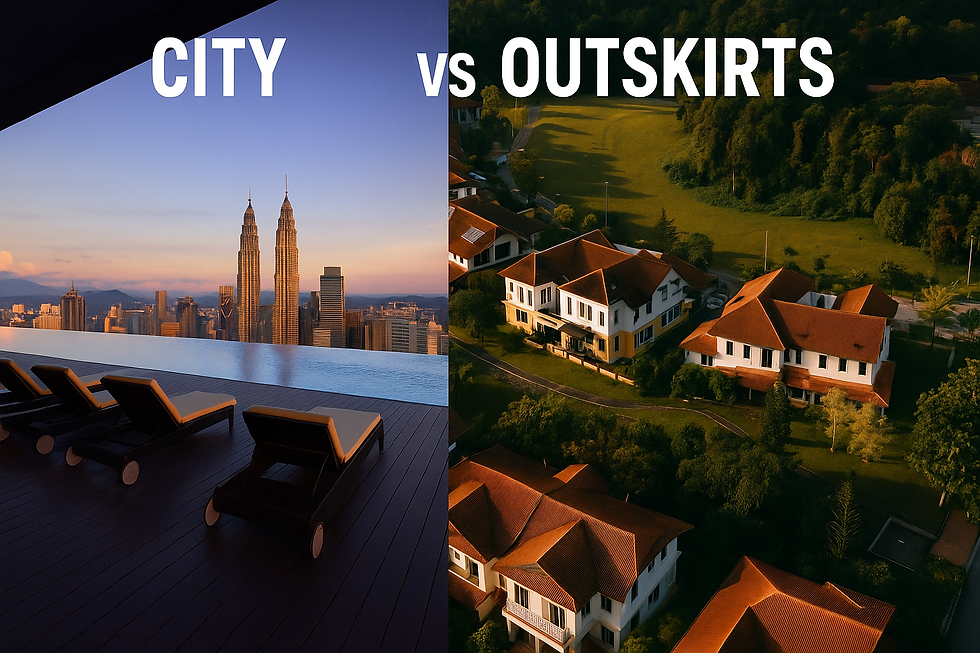What I Learned After Talking to Property Agents in Beijing
- propertychanwk
- Nov 11, 2025
- 3 min read
Updated: Nov 14, 2025
“What’s the biggest difference between buying a property in Beijing and buying one in Kuala Lumpur?” --A Real Estate Perspective by Wendy Chan
Why I Went to Beijing
So earlier this year, I decided to find out for myself.

I travelled to Beijing — not as a tourist, but as a property professional curious to understand the local market.
I met with a few experienced real-estate agents who had worked there for over a decade.
After several conversations and on-site visits, I came back with a very different perspective.
What Buying Property in Beijing Really Feels Like
In Beijing, buying property is not only about money — it’s about qualification. If you are not a local, you must prove five consecutive years of social-security contribution just to be eligible. Even after that, you face a long process of mortgage screening, income verification, and complex approvals.
Most residential units are 70-year leasehold, meaning you technically rent the land from the government. When I viewed a small 45-square-metre apartment near the fifth ring road, the agent proudly said, "It's convenient — you can reach the city centre in one hour by subway.”
That sentence stayed with me. In Beijing, people don’t talk about space or comfort; they talk about survival distance. The price, the pressure, and the policy restrictions — everything revolves around “staying qualified. ”Owning a home there feels more like winning an admission ticket than building a home.
Kuala Lumpur: Same Budget, Different World

Back in Kuala Lumpur, I revisited several projects priced around RM3million —TRX Residences, SO/ Sofitel, Pavilion Hilltop, and Agile Bukit Bintang. All are located in prime central districts, and most are freehold properties with luxurious facilities: swimming pools, gyms, concierge service, 24-hour security, and covered parking.
Foreign buyers are welcomed here. You can purchase any property above RM1million, and the entire legal process is done in English, guided by licensed lawyers. From booking to ownership transfer, the process usually takes about three months —simple, transparent, and predictable.
Most importantly, the lifestyle that comes with it is completely different. After work, you can swim under the skyline, walk to fine restaurants, or enjoy the sunset from your balcony. It’s a kind of calmness and freedom that money alone can’t describe.
My Reflection
One Beijing agent said something that I’ll never forget:
“In Beijing, people buy property not for living — but for staying qualified.”

That sentence explains everything. The value of property in many Chinese cities is built on restrictions and scarcity. But in Kuala Lumpur, property still represents freedom, lifestyle, and genuine ownership.
For me, the difference isn’t just about “cheap versus expensive.” It’s about what kind of life you’re actually buying into. In Beijing, you buy stress and status. In Kuala Lumpur, you buy space, sunshine, and possibility.
Final Thoughts
With the same budget — around RM3 million or RMB4million —
you can choose between two very different lives:

In Beijing, you get a small apartment and long commutes.
In Kuala Lumpur, you get a spacious residence, a better pace, and peace of mind.
That’s why I continue to share these stories —not to compare cities, but to help more people see that property is not just an investment; it’s a lifestyle decision.
If you’re curious about what kind of property fits your lifestyle and long-term goals, I’d love to share more insights with you.

Connect via Whatsapp
Planning to invest in Kuala Lumpur’s growing property market?
Start with insights from our KL Real Estate Guide or New Property Listing— your one-stop resource for premium projects, rental returns, and foreign buyer guidance.





Comments